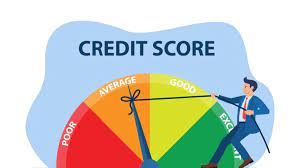
Are you applying for a Loan or getting higher interest rate on your approved loan? Chances are you have not so-good Credit Score and never really gave relevance to it before. A Credit score is a three-digit number which defines your how much credit worthy a customer is and how easily you can get loans, credit cards or even better deals on interest rates.
There can be various factors which impact your Credit Score but ensuring timely EMIs to your loans and credit cards can keep it in check and always put you in a good range.
What Is Credit Score?
Credit score is basically your financial report card which can highly impact your financial future. The higher your score is, higher it is likely to be approved for various loans and better rates. There are various factors which impact your financial report card including your repayment history, debt utilization, credit duration, credit mix and new account openings.
Currently, 4 credit bureaus operate in India i.e., TransUnion CIBIL, Experian, Equifax & CRIF High Mark. They compile scores and analyzes the individual’s history and disburse the required information about customers in the market.
What Is a Good Credit Score?
Credit score with detailed credit report is provided by above stated 4 Credit bureaus. These scores are also bought by various banks and financial institutions. Although, every bureau can have a different credit range, but they have somewhat similar benchmarks for customers to analyze. Reserve Bank of India has given licenses to 4 credit bureaus in India and following are range as per difference agencies:
CIBIL is one of the widely used rating agency used in India. Cibil Limited maintains credit files on roughly 600 million individuals and over 32 million businesses. CIBIL India is part of TransUnion, an American multinational group.
| CIBIL RANGE | RATING |
| 300-499 | Poor |
| 500-649 | Average |
| 650-749 | Good |
| 750-900 | Excellent |
Equifax India gathers information on customer’s credit history and complete information about customer’s previous credit history as well. It also offers Credit Risk, fraud management and portfolio management for companies.
| Equifax RANGE | RATING |
| 280-559 | Poor |
| 560-659 | Fair |
| 660-724 | Good |
| 725-759 | Very Good |
| 760-850 | Excellent |
Experian provides Credit Information report to its customers in India. Credit companies use their data to provide credit cards to customer who lie above range of 650+.
| Experian RANGE | RATING |
| 300-549 | Poor |
| 550-649 | Fair |
| 650-749 | Good |
| 750-799 | Very Good |
| 800-850 | Excellent |
CRIF Highmark is an Indian company and provide Microfinance credit report along with Credit Information reports for the individuals. It also provides Identification and Anti-fraud services with predictive analysis and scorecards for the companies.
| CRIF RANGE | RATING |
| 300-549 | Low |
| 550-649 | Medium |
| 650-749 | High |
| 750-900 | Excellent |
A customer should always aim for at least 700+ credit score which can enable them to better loan approvals, higher credit cards limit and lower possible interest rates. It is not necessary that just because you have a GOOD credit score as per an Auto loan lender means same benchmark is being considered by a home loan lender or any other loan lender. Each lender might have their benchmark of good credit score Vs bad score. They can differ in their opinion of customer’s credit worthiness depending on size and type of loan.
How to Check Your Credit Score?
Credit Scores are bought by various websites and NBFCs from 4 approved agencies. They allow user to create a free account to check their scores and get various reports while offering them various deals on Credit cards and Loans based on their credit history. You can either check it for free (not a detailed report) or pay a nominal fee depending on various subscription plans. It can help you to keep a check on your credit score as it can keep changing.

How Your Credit Score Is Calculated?
5 Main factors can influence your credit score by Credit agencies while analyzing your credit history:
- Payment History
- Credit Utilization
- Credit Duration
- Credit Mix
- New Credit/Account opening.
How to Improve your Credit Score?
If you have credit score in range of “Fair” or worse, you should start taking following steps to improve your financial report over a period of time:
- Pay Bills on Time: You should pay your outstanding bills w.r.t Credit Cards or paying EMIs on time or even before time. They are one of the biggest factors impacting your score.
- Credit Utilization: You should keep a check on your credit utilization limit. If your limit is 2 lacs and you’re utilizing 1 Lacs or above on average , you’re utilizing 50% of your limit. One should focus on keeping utilization below 25% or less.
- Credit Report: As stated above, you must keep a track of your credit report and optimize it at least quarterly by spotting any errors and where you’re over-spending and not paying on time. It might have a negative impact on your credit score so you should take steps to correct them.
- Credit Mix: It refers how broad your credit history and respectively financial records. It includes various types of credit. They can be home installments, auto-loan, student loans , personal loans and credit cards. They can significantly impact your credit score and is well diversified. A broader credit history provides confidence to lenders and give them comprehensive understanding.
Does income affect credit score?
No, it doesn’t define your credit score. The size don’t influence whether your score will be good or bad. However, your credit or loan approval size matters on your income as it provides assurance to lender about your repayment capability.
How to get 800 credit score?
Customers have 800+ Credit score have long credit history. It doesn’t necessarily mean how long you’ve used your credit but average age of accounts open on your report and closing your old credit cards are not a smart move.
What is a good credit score by age?
Ideally your Credit score should be minimum 649 at any given age. It makes your life easier to borrow from banks and NBFCs. As per various reports, People with less than age of 25 have least healthy report and people in age bracket of 30-40 are most credit healthy. There can be various factors as below age of 25 are generally students or pursuing various courses with little or less income source.
Bottom Line:
Your credit Score can significantly impact your financial life and hinder you build long-term assets in future. One should always strive to maintain good and healthy score which can enable to fulfill your financial goals. LTV of credit score can be compounded into an invaluable asset for lifetime.

